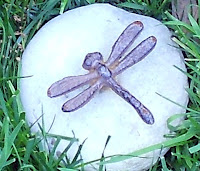Although current American pop culture tends to describe
dragonflies as primarily symbolic of attributes
like self-realization or positive change,
dragonflies in American folklore tell a much different story,
one unrelated to the cultural symbolism discussed in yesterday's blog.
And the differences start with the name.
The lexicon of each American regional dialect
contains competing names for many words and terms,
People who love words should become familiar
with the Dictionary of American Regional English,
a project started decades ago by the American Dialect Society
and whose last volume was only recently published.
The DARE project's objective is to preserve and document
American regionalisms--not slang terms,
but the words and phrasings that help comprise American dialects
and make them unique.
The project has a fascinating web site with tons of information,
including audio samples and sample lists of synonyms,
including a listing of dragonfly terms by region.
Terms for dragonflies are often rooted in American folklore
and generally can be divided into two main categories:
those associating dragonflies with needles
and those associating dragonflies with snakes.
According to DARE, dragonflies are called sewing needles, darning needles,
or eye stitchers, primarily in northern regions of the US.
And why needles?
According to the University of Kentucky Entomology
web site maintained by Blake Newton:
dragonflies were believed to be
capable of sewing up a person's lips or ears.
This association with ears would also explain why
DARE lists "ear cutters" as a regional synonym for dragonflies.
All rather grisly prospects from a flying insect
that seems to delight so many of us nowadays.
But there is apparently a more nurturing
--if dubious--side to dragonflies.
The DARE site lists these other dragonfly synonyms:
snake doctor, snake feeder, snake guarder,
snake heeder, and snake waiter.
On the University of Kentucky web site,
Newton provides a plausible folk explanation for
the inclusion of "snake" in so many terms for dragonfly.
He includes a comment from Earlane Cox,
who explains that dragonflies were once thought
to care for the needs of snakes,
even helping snakes raise their little baby snakes.
Snake appellations seem to be more common in the southern US,
where dragonflies and snakes are found in proximity
to swamps and marshes.
DARE says that in Hawaii,
dragonflies are called "globe skimmers."
I'll use that as a synonym for dragonflies from now on.
It evokes images of a benign creature
taking gentle flight on a summer day.
That shouldn't give any of us nightmares.
<>

No comments:
Post a Comment